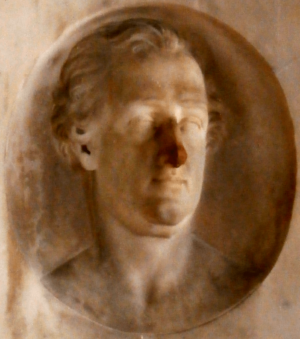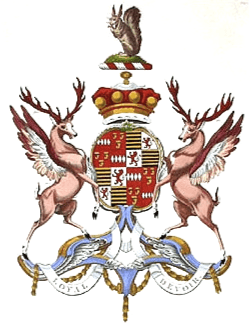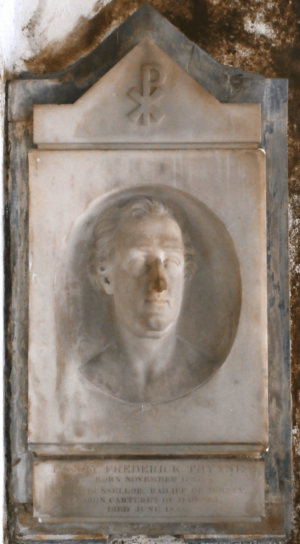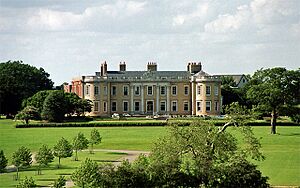Henry Carteret, 1st Baron Carteret facts for kids
Henry Frederick Carteret, 1st Baron Carteret (1735–1826) was an important person in British politics. He was a member of the Privy Council, which advises the King or Queen. Before 1776, he was known as Henry Frederick Thynne.
He served as a Member of Parliament (MP) for different areas, including Staffordshire and Weobley. He also worked for King George III as his Master of the Household. From 1776 until his death, he was the hereditary Bailiff of Jersey. This was a special role passed down through his family.
Contents
Family Background
Henry Frederick Carteret was born into a well-known family. His father was Thomas Thynne, 2nd Viscount Weymouth (1710–1751). His mother was Louisa Carteret. She was the daughter of John Carteret, 2nd Earl Granville (1690–1763).
This meant he was the younger brother of Thomas Thynne, 3rd Viscount Weymouth. His brother later became the first Marquess of Bath.
His Education
Henry Frederick Carteret went to St John's College, Cambridge. He earned his first degree, a BA, there. In 1753, he continued his studies and received a MA. Later, in 1769, he was given the special degree of Doctor of Civil Laws.
Political Career
In 1757, Henry Frederick Carteret became a Member of Parliament (MP). His friend, Granville Leveson-Gower, 2nd Earl Gower, encouraged him. He represented Staffordshire until 1761.
After that, in 1761, he was elected to represent Weobley in Herefordshire. He held this seat until 1770.
In 1762, his brother helped him get a job as the Clerk Comptroller of the Green Cloth. This was a good position, paying £1000 a year. He lost this job in 1765 when the government changed.
When his brother returned to power in 1767, Henry Frederick Thynne also returned to royal service. He became the Master of the Household for King George III. This job paid over £900 and he held it until 1771.
In 1770, he became a member of the Privy Council. This group advises the King. In 1771, he was made a joint Postmaster General. This was a very important role, paying £3000 a year. He held this job until 1789. After becoming Postmaster General, he left the House of Commons. He stopped being Postmaster General in 1789. This was when his brother was given the title of Marquess of Bath.
Inheritance and New Title
In 1776, Henry Frederick Thynne received a large inheritance. His uncle, Robert Carteret, 3rd Earl Granville, had no children. So, Henry inherited his uncle's estates. These included Hawnes Park in Bedfordshire and Kilkhampton in Cornwall.
As part of this inheritance, he also had to change his name and family shield (arms) to Carteret. This was a requirement from his uncle's father's will. He also took over the role of Bailiff of Jersey. This was a lifetime position that had been held by leaders of the Carteret family for a long time.
In 1784, he was given a special title by the King. He became Baron Carteret, of Hawnes. This brought back his uncle's second title.
Changes to Hawnes Park
Henry Carteret, 1st Baron Carteret, made many changes to Hawnes Park. He modernized and partly rebuilt the house. Around 1785–1790, he rebuilt the south side of the building. It is thought that James Lewis designed these changes.
In 1813, a historian named Lysons wrote about Hawnes Park. He said the house had two courtyards. It also contained paintings of famous people. These included Margaret, Countess of Lennox and the mother of the famous painter Rembrandt. There was also an old picture of Longleat, which was the home of the Thynne family.
Marriage and Family
In 1810, Henry Frederick Carteret married Eleanor Smart. They had been together for many years. However, they did not have any children.
Death and Successor
Henry Frederick Carteret passed away in 1826. Because he had no children, his title of Baron Carteret passed to his younger nephew. This was Lord George Thynne (1770–1838). This happened because of a special rule made when Henry was first given his title.
A simple white marble monument honors him in Kilkhampton Church, Cornwall. It has a bust (a sculpture of his head and shoulders). The monument says: "Henry Frederick Thynne. Born November 1735. Privy Counsellor, Bailiff of Jersey, Baron Carteret of Hawnes. Died June 1826".
 | William L. Dawson |
 | W. E. B. Du Bois |
 | Harry Belafonte |





